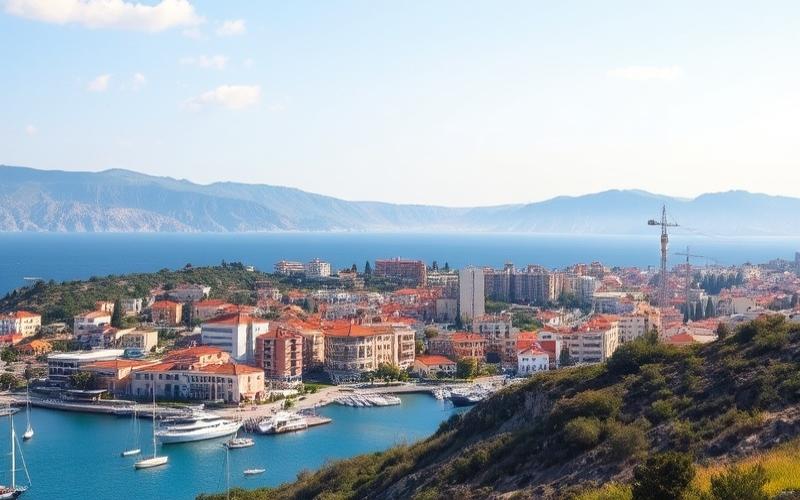
 Published on and written by Cyril Jarnias
Published on and written by Cyril Jarnias
Investing in parking facilities in Cyprus offers attractive profitability potential for investors seeking to diversify their portfolios. With sustained economic growth and expanding tourist flows, the demand for parking spaces in major Cypriot cities continues to rise.
By combining relatively low entry costs with stable and recurring returns on investment, this sector can represent a strategic opportunity in the local real estate market. Furthermore, the island’s political and economic stability, coupled with attractive tax incentives, makes Cyprus a preferred destination for real estate investments.
Benefits of Investing in Parking Facilities in Cyprus
The Cypriot real estate market is currently experiencing sustained growth, as evidenced by the remarkable performance in the first quarter of 2025, with steadily increasing transaction volumes and sales values. Limassol maintains its dominant position with transactions worth €428.7 million and 1,295 contracts signed, confirming intense investor activity and strong demand for both old and new properties.
The resilience and moderate growth of the Cypriot real estate market in 2025 are attracting numerous foreign investors. This positive trend naturally extends to the parking sector, where demand is increasing alongside overall real estate development. The low vacancy rate in urban areas, particularly in Limassol and Paphos, ensures stable and predictable rental returns for investors.
Average returns for parking investments in Cyprus are particularly attractive compared to other real estate sectors:
| City | Average Return (Parking) | Average Return (Apartments) |
| Limassol | 7.2% | 4.5% |
| Paphos | 6.8% | 4.2% |
| Nicosia | 6.5% | 5.1% |
| Larnaca | 6.3% | 4.8% |
Cyprus also offers significant tax incentives to foreign investors, further enhancing the appeal of the real estate market. The government of Northern Cyprus, in particular, actively supports real estate market development by offering various incentives, including the possibility of obtaining a residence permit.
Growing urbanization and flourishing tourism significantly amplify the need for parking solutions. In Limassol, the average price per square meter for a seafront apartment increased by 25% between 2023 and 2025, reaching €4,500, while in Paphos, properties near historical sites saw their value climb by 15% over the same period.
“My investment in a Limassol parking facility allowed me to diversify my portfolio with a low-maintenance asset while generating a stable 7% annual return since 2023. Demand continues to grow with the development of luxury tourism in the region.”
Paphos is currently experiencing strong demand among foreign buyers, while Nicosia recorded 1,304 residential real estate transactions worth €283.5 million and 932 registered sales contracts. The continued interest in new developments confirms the capital’s persistent appeal.
The Northern Cyprus real estate market remains one of the most affordable in the Mediterranean, making it particularly attractive to foreign investors. With most properties located near the coast, their added value is considerable and continues to increase with tourist influx.
Good to Know:
Investing in parking facilities in Cyprus offers numerous advantages, thanks to a favorable economic climate and attractive tax incentives offered to foreign investors. The rapid growth of the real estate sector increases parking demand, especially in urban areas with low vacancy rates, ensuring stable rental returns. According to recent data, average returns for parking investments in Cyprus range around 5-7% annually. Additionally, booming urbanization and tourism emphasize the need for parking solutions, creating lucrative opportunities. Investors already testify to the profitability of this dynamic market, reinforcing its appeal in this developing niche.
Profitability Analysis of Parking Facilities in Cyprus
The profitability analysis of parking facilities in Cyprus depends on the balance between initial costs, operating expenses, and revenue generated from various sources. Several factors strongly influence this profitability:
Major Cost Factors
- Land acquisition costs: Prices vary significantly by location (downtown, tourist areas, or outskirts). Tourist demand in Cyprus drives up land prices in certain neighborhoods.
- Construction costs: Surface parking lots have lower per-square-meter costs than underground or multi-story parking facilities. Integrating technological solutions (automatic terminals, centralized management) represents an additional investment but optimizes operations.
- Local taxes and administrative fees: Annual property tax varying by municipality, planning fees, and potential specific parking taxes.
- Operating expenses:
- Routine maintenance (surface upkeep, lighting)
- Management (staff or outsourcing)
- Insurance
- Energy costs
- Depreciation of electronic equipment
Cost/Potential Revenue Comparison
| Item | Estimated Annual Cost | Potential Annual Revenue |
|---|---|---|
| Land | High in tourist areas | — |
| Construction | Medium to high | — |
| Local taxes | Moderate | — |
| Operations | Low to moderate | — |
| Hourly payments | — | Main revenue source – depends on occupancy rate and dynamic pricing |
| Subscriptions | — | Stable; local/professional clientele |
| Special events | — | Occasional peak during festivals/seasonal tourism |
Factors Influencing Revenue
- Hourly rates adjusted by area: higher in attractive urban centers/tourist zones.
- Monthly subscriptions for local businesses or residents.
- Exceptional income during sports/cultural events.
Geographic location is decisive: immediate proximity to beaches, hotels, or heritage sites increases annual occupancy rates. However, tourist seasonality creates significant volatility between high and low seasons.
Role of Local Partnerships & Financing
Partnerships with hotel/restaurant businesses increase occupancy rates through preferential agreements for their customers/employees.
Financing opportunities:
- Municipal grants for projects integrating electric charging stations or eco-friendly solutions
- Bank loans dedicated to tourism infrastructure
Emerging Trends & Sector Outlook
The global parking market is expected to grow annually by around +3.7% until 2029 due to continued urbanization and technological development: widespread adoption of connected parking meters/mobile payment/SaaS management.
Recent statistics show that investment in this sector remains solid despite increased competition; however, it’s important to monitor:
- Sudden regulatory changes imposing environmental quotas/anti-pollution regulations
- Economic dependence on international tourism (sensitivity to health/geopolitical crises)
- Significant annual variation due to the seasonal nature of Cypriot tourism
Outlook
Prospects are favorable if investors primarily target:
- Strategic locations near tourist hubs/city centers;
- Revenue diversification through subscriptions & events;
- Rapid integration of smart parking technologies to reduce operational costs.
A trend toward shared mobility is also observed, encouraging some operators to partially convert their areas to accommodate electric charging stations/carpooling – an additional opportunity if anticipated early enough.
Good to Know:
The profitability analysis of parking facilities in Cyprus reveals that land acquisition costs are generally high in popular tourist areas like Limassol and Paphos, where parking demand is increased, especially in summer. Local taxes vary by municipality, while operating expenses include maintenance and security, which impact profit margins. Potential income, driven by parking fees and monthly subscriptions, is influenced by tourist influx, and parking usage during special events offers additional gains. Strategic partnerships with local businesses and access to advantageous financing can reduce initial costs. However, risks related to regulatory changes, economic conditions, and seasonal fluctuations in tourist traffic must be considered. Recent studies highlight continuous sector growth, with a trend toward digital solutions to optimize user experience and space management.
Case Study: Airport Parking Success
The evolution of airport parking in Cyprus occurs in a context of continuous tourism growth and air traffic, stimulating notable transformation both historically and economically. Since the 2000s, the growth of the Cypriot tourism sector has led to the modernization of airport infrastructure and the rise of ancillary services such as long-term or premium parking.
Major airports – Larnaca (LCA) and Paphos (PFO) – have seen their traffic steadily increase. Between 2015 and 2023, annual passenger numbers at Larnaca rose from approximately 7 million to over 11 million, while Paphos exceeded 4 million. This sustained growth generated increased demand for reliable, accessible, and profitable parking solutions.
Comparative Table: Traffic Evolution & Profitability
| Year | LCA Passengers | Estimated Parking Revenue (€M) |
|---|---|---|
| 2015 | ~7 M | ~8 |
| 2019 | ~11 M | >12 |
| 2023* | >12 M | >13 |
Key factors contributing to the success of airport parking in Cyprus are multiple:
- Strategic location: immediate proximity to terminals allows quick access for both domestic and international travelers.
- Service diversification: premium offers (valet), flexible pricing based on duration or customer segment (leisure vs. business travelers), integration with rental agencies.
- Efficient management: introduction of digital tools for online booking, automated vehicle flow management.
- Synergy with tourism and air development: Cyprus’ growing attractiveness as a destination generates captive clientele year-round.
These elements have guided investment decisions:
- Local groups capitalized on structural traffic growth to expand their capacities or diversify their services.
- International investors partnered with historical operators to import innovative models from Western Europe (automated/robotic parking).
- Visibility on profitability linked to constant flow offers an attractive defensive profile for specialized real estate funds.
Concrete example: The parking at the new passenger terminal of Limassol port/airport illustrates these successes:
Modern terminal with integrated large parking, separate arrival/departure/baggage halls, panoramic restaurant; centralized management optimizing traveler experience; easily replicable model for other sites with high seasonal volume.
Replicable Deployed Strategies:
- Invest in complete digitalization: web/mobile booking coupled with license plate recognition/automatic timers
- Offer expanded range: express/premium valet + economical long-term options
- Partnerships with car rental/travel agencies facilitating all-in-one packages
- Pricing flexibility according to seasonality
Challenges Encountered & Responses Provided:
Main Challenges List:
- Occasional saturation during summer tourist peaks
- Enhanced security against theft/vandalism during long-duration periods
- Rapid adaptation post-COVID facing brutal traffic variability
Strategic Responses:
- Progressive capacity expansion & creation of additional temporary lots during predictable peaks
- Enhanced video surveillance/anti-intrusion systems + dedicated security teams
- Dynamic pricing modulation/promotional offers based on actual load anticipation
The observed upward trajectory demonstrates that these initiatives combine high operational efficiency with the ability to absorb external shocks while maintaining financial attractiveness for private investors.
Good to Know:
Airport parking in Cyprus has experienced fruitful evolution, strongly influenced by the rise of tourism and air traffic. Since the early 2000s, with air traffic reaching over 10 million annual passengers in 2022, these infrastructures have benefited from increased profitability. The strategic location near major transport routes, combined with efficient management and diversified service offerings like online booking and shuttle services, contributed to their success. Parking facilities such as Larnaca International Airport illustrate this successful model, with occupancy rates nearing 90% and annual revenue growth of 15%. Investors, both local and international, are attracted by this profitable potential, and overcoming challenges such as the pandemic was possible through cost optimization and service digitalization. These strategies, focused on innovation and adaptability, serve as a model for other similar investment projects.
Tips to Maximize Parking Space Returns
Specific Strategies to Maximize Parking Space Returns in Cyprus
- Smart use of technology:
- Installation of connected sensors (IoT) to detect real-time occupancy and inform users via mobile application.
- Digital payment facilitated by bank card or SMS, allowing quick access and limiting queues.
- Automated monitoring with targeted violation control through centralized information feedback.
- Dynamic pricing:
- Automatic rate adjustment according to time, day, or season to maximize occupancy and revenue.
- Continuous analysis of occupancy rates to maintain optimal threshold above 85%.
- Possible customization by location (e.g., proximity to elevator or entrance) based on usage history.
| Strategy | Expected Impact |
|---|---|
| IoT Sensors | Increased turnover, instant visibility |
| Mobile Payment | Simplified customer journey |
| Dynamic Pricing | Revenue maximization |
- Regular maintenance:
- Frequent checks for cleanliness, renewed floor signage, functional lighting, and controlled security.
- Reduce accident risk and improve site attractiveness to users.
- Diversified additional services:
- On-site car cleaning
- Short-term or long-term electric bike rental
- Electric vehicle charging stations
These services not only provide an enriched experience but also significant diversification of financial flows from the parking facility.
Legal Aspects & Local Trends:
- Strict compliance with Cypriot regulations regarding urban parking management: mandatory designated zones in certain cities; enhanced monitoring against illegal parking; transparency on publicly displayed rates.
- The state sets certain maximum prices; it’s necessary to regularly verify compliance during seasonal or hourly rate changes.
- Local trend toward more “smart” solutions supported by communities to improve urban mobility and citizen satisfaction. Technological investments are valued in this context.
The combined integration of technology/flexible pricing/maintenance/complementary services proves essential to sustainably optimize financial returns while meeting local legal requirements.
Good to Know:
To maximize parking space returns in Cyprus, it’s crucial to use smart management systems enabling real-time tracking of space availability and adjusting rates according to time or season, thus maximizing income. Regular maintenance is essential to maintain safety and attractiveness, while diversification through additional services such as car cleaning or bike rental can enhance offerings and attract a broader clientele. It’s also important to stay informed about local legal developments, such as regulations on eco-friendly practices, which can influence parking operations and returns. Cypriot market trends, such as increasing tourism or urban area development, should be carefully considered to anticipate and adapt to demand.
Disclaimer: The information provided on this website is for informational purposes only and does not constitute financial, legal, or professional advice. We encourage you to consult qualified experts before making any investment, real estate, or expatriation decisions. Although we strive to maintain up-to-date and accurate information, we do not guarantee the completeness, accuracy, or timeliness of the proposed content. As investment and expatriation involve risks, we disclaim any liability for potential losses or damages arising from the use of this site. Your use of this site confirms your acceptance of these terms and your understanding of the associated risks.

















































